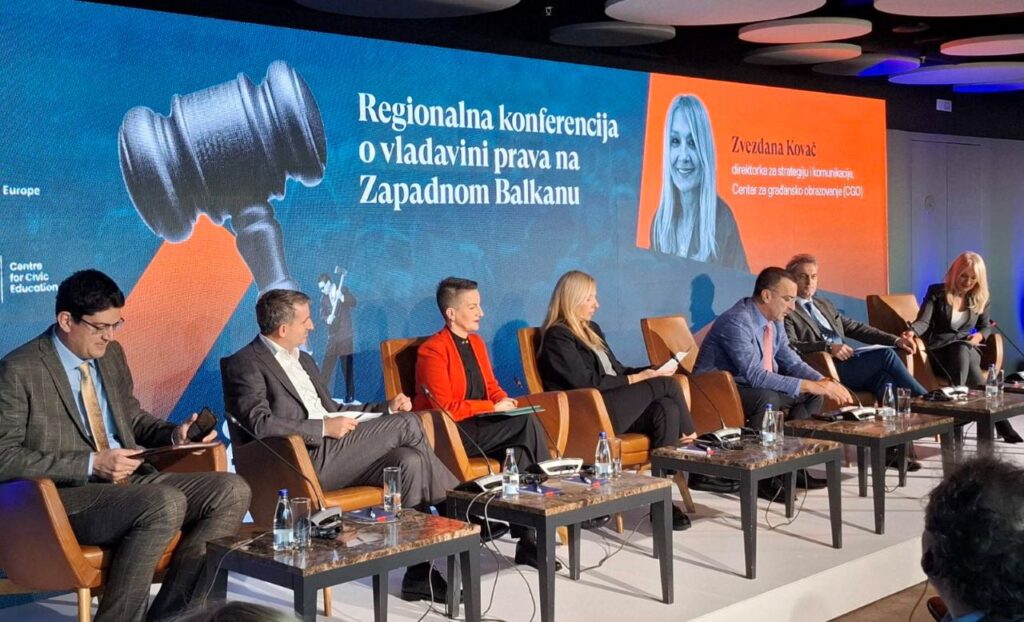The rule of law is a determining factor in whether the countries of the region will move toward economic and social development or stagnate and sink into problems, according to a message from the regional conference on the rule of law in the Western Balkans, organized by the Centre for Civic Education (CCE) and the German Friedrich Ebert Stiftung (FES).
During the panel “Towards a just future through strengthening the rule of law in the Western Balkans,” the Chair of the Board of Directors of Transparency International in Bosnia and Herzegovina, Srđan Blagovčanin, emphasized that ensuring political will is crucial for successfully establishing and strengthening the rule of law. He stated this remains a central issue for the region.
“The rule of law is a key factor in determining the path for Western Balkan countries—whether we move toward economic, social, and other forms of development or remain stagnant and sink into persistent problems,” Blagovčanin said.
He pointed out that corruption is not eradicated in any country and that Western Balkan countries share similar problems due to deeper structural issues. He explained that he primarily refers to the phenomenon of state capture, representing the most complex form of corruption, where political elites or ruling structures seize control over the country, processes, and institutions, subordinating their work and operations to the particular interests of a narrow group of people at the top of the power pyramid.
“Prosecuting political corruption is an indicator of the independence of the judiciary. If political corruption is not prosecuted, it is a reliable sign that the judiciary in that country is under political influence,” Blagovčanin said, adding that in all countries of the region, political corruption largely goes unpunished, indicating undue political influence on the judiciary. However, he emphasized that this does not mean the entire judiciary is under political control.
Another part of the problem concerning the rule of law in the region, he said, relates to the fact that all Western Balkan countries are recognized as hybrid regimes. “On paper, we are all democratically governed countries. However, in practice, we significantly lean toward autocratic practices, primarily due to the absence of a fundamental separation of powers,” he explained.
“The dominance of the executive branch is characteristic of all countries in the region, with the legislative and especially the judicial branches being subordinate and dependent on the executive branch,” said Blagovčanin.
According to him, recognizing that reforms are not merely technical processes but also political processes requiring political will is essential in freeing states-it is not enough to write a good law, establish a new institution, and strengthen capacities both in staffing and materially.
Miloš Vukčević, a professor at the University of Mediterranean and a lawyer, noted that while Montenegro is a leader in EU integration processes, it has been negotiating the longest, and there is a growing fatigue within the judiciary and institutions, which increasingly lack the necessary personnel and t administrative-technical capacities.
“How can we achieve the rule of law if we lack judges and prosecutors? And what is the cause of this? I fear that Montenegro and the region will face a shortage of qualified personnel, although the judiciary should be seen as a privilege,” Vukčević remarked.
He pointed to a deeper, more complex problem, illustrated by the decline in law school enrollment over the years. “The root cause lies in the current state of the judiciary and prosecution. Judicial work is demanding and responsible, while salaries in judiciary have remained low and stagnant for about a decade,” Vukčević noted.
He emphasized that Montenegro and other regional countries must address this issue. “For years, we have talked about the so-called Palace of Justice, as if it is a project worth 300 or 400 million EUR, yet we haven’t seen a public call for a conceptual design. The reason for this, among others, is that the political elite – both past and present – do not want a strong and independent judiciary,” Vukčević said.
He deemed Prime Minister Spajić’s recent statement about “shameful judgments” as inappropriate, discouraging potential judges and prosecutors, and stressed the need to restore public confidence in the judiciary, which is currently very shaken.
Discussing SKY encrypted communication, Vukčević stated that Montenegrin courts must clarify whether the SKY app is admissible as evidence. “It would be helpful to receive that answer as soon as possible,” he emphasized.
Vukčević believes that Montenegro has regressed in terms of transparency. “We had a number of laws adopted without public debate, which the European Commission also highlighted in its report,” he recalled.
Professor Vanja Bajović from the Law Faculty at the University of Belgrade, identified key challenges to the rule of law as corruption, partisan politics, and judicial dependency. “As a citizen of Serbia, I get the impression that democracy and the rule of law are political catchphrases invoked by each government only until they come to power, only to be distorted once they are in control,” said Bajović.
She stated that whistleblowers in Serbia are not protected; instead they are punished and marginalized for their contributions.
“ When we talk about corruption, it initially sounds like an abstract concept. Corruption remains silent and unseen until it starts taking lives, as we have unfortunately witnessed in both Bosnia and Herzegovina and Serbia,” Bajović pointed out.
According to her, the system of partisan politics favours the loyal over the competent individuals, which has been exacerbated by the degradation of the educational system. “We see that private universities have become training grounds for political cadres, with continuous diploma-buying and a range of unqualified individuals occupying institutions. As a result, incompetence takes its toll. Scandals arise without judicial outcomes, and the cycle repeats as one scandal overshadows the previous,” she added.
She also remarked that judicial dependency is reflected in legal inequality, with citizens seeing no way out of this vicious cycle.
“Now, citizens expect accountability for Ribnikar, for the Novi Sad tragedy. No one takes responsibility because they are used to operating under political and judicial protection,” said Bajović.
“Regarding international actors, there is public dissatisfaction, particularly visible in the election fraud scandal and the Rio Tinto affair,” she stated, adding that public pressure has been the only force yielding results so far.
Besa Arifi from the South East European University Faculty of Law in North Macedonia emphasized that the country has a unique history in developing the concept of the rule of law, warning that the failure to establish it leads to pessimism among progressive citizens and the rise of alternative ideologies.
“For the rule of law to take root in North Macedonia and other Western Balkan countries, it is essential to support individuals of integrity,” Arifi emphasized.
In response to a question about whether resolving the dispute with Greece was sufficient for progress on the European path, she recalled that North Macedonia was the first to sign the Stabilization and Association Agreement, gained candidate status in 2005, and progress then stalled. “After that, citizens expected a green light for opening negotiations, though becoming an EU member was not expected. The veto on opening negotiations was a huge blow and a boost to nationalists who argued that we did everything required, but gained nothing,’” Arifi said.
Executive Director of the Kosovo Law Institute, Ehat Miftaraj, stated that the Kosovo Government has been unable to finalize an anti-corruption strategy, adding that such a document would demonstrate the executive branch’s commitment to addressing this isssue. He also mentioned that previous drafts of the document conflicted with various legal provisions.
Miftaraj added that Kosovo’s Ministry of Justice has yet to establish an action plan for its rule of law strategy.
He reminded that Kosovo also passed a Law on Conflict of Interest, noting cases where certain high-ranking officials held multiple roles simultaneously. “The law was passed in 2019, effectively addressing this issue,” he noted.
Executive Director of the Center for the Study of Democracy and Governance, Arijan Dirmiši, said that Albania has made significant progress in strengthening the rule of law, thanks to judicial reforms that began in 2015.
Although indictments in corruption cases should discourage others from engaging in corrupt acts, corruption remains, which does not mean the reforms have been ineffective; rather, the results are still limited. He added that it remains to be seen whether these reforms will increase public trust in the system.
Agency MINA



